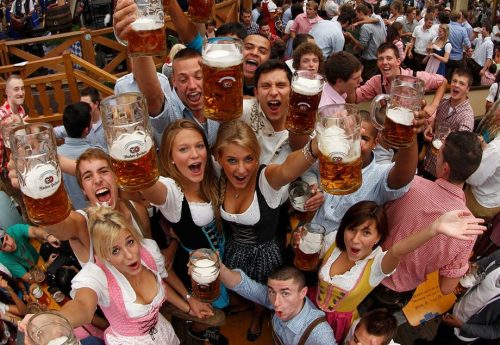
Oktoberfest is often associated with beer, but the festival’s traditions go beyond that. While the beer tents, of course, provide drinks, they also play only traditional Bavarian music. The original six Munich breweries still provide the beer. You can also catch people in traditional Bavarian clothing, dirndls and lederhosen.
Here are some Oktoberfest traditions that define the famous beer festival.
The Opening of the Oktoberfest
Since 1950, the Oktoberfest begins at noon on a Saturday in the second half of September with the ceremony of tapping the first keg. This is traditionally done by Munich’s Mayor (currently Dieter Reiter) at the oldest tent of the festival, the Schottenhamel tent. The Mayor gives his best to tap the keg with the fewest possible hits with a hammer, as he knows that next day’s headlines will be about how many he needed before exclaiming “O’zapft is!” (keg breached).
The beer served at the Schottenhamel tent is Spaten-Franziskaner. A gun salute is fired in the air to the Bavaria statue. This tradition goes back many years and is a sign for the landlords in the other tents that they too can now begin to sell their beer.
Grand Entry of Landlords and Breweries
The ceremony at the Schottenhamel tent isn’t really the beginning of the traditional Oktoberfest ceremonies and festivities. About one hour before the “O’zapft is!”, the festival tent keepers and the breweries have their ceremony of taking over the Theresienwiese grounds where the festival will be held over the following two (and almost a half) weeks as part of the Grand Entry of Landlords and Breweries. A colorful procession of horse carriages and wagons decorated with flowers festively march down the Sonnenstrasse to the festival ground.
The procession is led by the Münchner Kindl (coat of arms of Munich). This is traditionally followed by the mayor’s festival carriage. Behind this come the splendid carts of the landlords and breweries. Waitresses holding the beer mugs are also part of the parade, ready for two weeks of hard work to begin following the festive procession.
Oktoberfest Beers and Main Festival Tents
The beer served at the Oktoberfest can only come from six old traditional and Munich based breweries (the so-called “Big Six”). The breweries are: Augustiner, Paulaner, Spaten-Franziskaner, Löwenbräu, Hacker-Pschorr and Hofbräu. Each of the main Oktoberfest tents serves its own brand. The tents are often run by the same Munich based families for generations. The families often also run wirtshauses, restaurants and beer gardens throughout Munich. Below is a list with the breweries and the main tents where it is served:
Augustiner: Augustiner-Festhalle, Fischer-Vroni
Paulaner: Armbrustschützenzelt, Winzerer Fähndl, Käfer’s Wies’n
SchänkeSpaten-Franziskaner: Marstall, Schottenhamel, Ochsenbraterei
Löwenbräu: Schützen-Festzelt, Löwenbräu-Festhalle
Hacker-Pschorr: Hacker-Festzelt, Pschorr-Bräurosl
Hofbräu: Hofbräu Festzelt
Trachten- und Schützenzug (Historical Costume and Riflemen – Shooting Club – Parade)
The highlight of the first Sunday of the festival is another colourful festive parade through Munich and to the festival grounds of the Theresienwiese, the Trachten- und Schützenzug (Historical Costume and Riflemen Parade). Some 9,500 people take part in the costumed parade with horse carriages and by foot, accompanied by brass orchestras and bands.
The parade begins at 10am. Participants aren’t limited to Munichers and guests from other parts of Germany, guests in historical costumes come from all parts of Europe, such as from Austria, Italy, Croatia, Switzerland and Poland. They alternate in colourful sequences with sports and mountain troops, marching bands, historic costume groups, fanfare blowers and flag throwers.
The route of the parade goes from the Maximilianeum through the city along the Maximilianstraße, the Residenzstraße to the Opera and further to the Odeonsplatz, where the parade halts to be greeted by the Prime Minister of the Free State of Bavaria and the Mayor). The parade then continues along the Briennerstraße to the Maximiliansplatz, Lenbachplatz, Karlsplatz (Stachus), Sonnenstraße, Schwanthalerstraße, Paul-Heyse-Straße, Kaiser-Ludwig-Platz until it finally reaches the Theresienwiese.
The costume parade was held for the first time in 1835, to honour the silver wedding anniversary of King Ludwig I and Therese of Bavaria, and since 1950 it has been held regularly and has become an event that is broadcast on live television.
Family Days
If you are planning to visit the many attractions of the Oktoberfest with children, the best days to do this are the Tuesdays which are traditionally family-days at the festival. Most of the rides and attractions are available for half of the regular price. The Family Days at the festival last from noon until 6pm.
Traditional Oktoberfest Souvenirs
Felt hats, beer mugs and gingerbread hearts are the most traditional Oktoberfest souvenirs. The Oktoberfest beer mug is redesigned every year and is a real collector’s item and popular souvenir. The classic design is already more than 100 years old.
The printed motif is new every year – namely the respective Oktoberfest poster for that year. The mug is available at most souvenir stalls. In addition, many landlords sell their own beer mugs with Oktoberfest motifs in their tents. Gingerbread hearts and felt hats are available everywhere at the festival.
The Closing of the Oktoberfest – Gun Salute
Just as the opening of the festival, the closing also has a traditional ceremony – the Gun Salute. On the last day of the Oktoberfest, the traditional gun salute takes place at noon at the Bavaria statue. Every year the shooting kings of the Oktoberfest shooting competition are crowned here and this is celebrated with a salute. So, just as the Oktoberfest begins with the traditional twelve gun salute after the keg has been tapped, it ends in typical Bavarian fashion with brass bands and lots of saluting guns.
Photos via https://goo.gl/iVMNf1.
Related articles:
The Role of Beer in German Society: More Than Just Oktoberfest
Biergartens in Germany
Oktoberfest in Germany
German Beer – the Absolutely German Drink
Oktoberfest…The Fest Of Times
Oktoberfest Beyond the Beer: Traditions You Didn’t Know Existed
What to Wear to Oktoberfest: Dirndls, Lederhosen, and Modern Tracht
